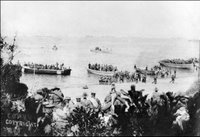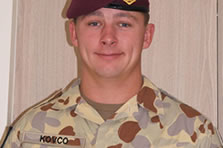we will remember them

Part of the 4th Battalion landing on the beaches of ANZAC Cove at 8 am on 25 April 1915.
The ANZAC Dedication, Dawn Service, 25 April 2006
At this hour, on this day, 91 years ago, the Australian and New Zealand Army Corps, at Gallipoli, made immortal the name of ANZAC and established an imperishable tradition of selfless service, of devotion to duty and of fighting for all that is best in human relationships.This morning I stood with 27,000 people in the cold chill of pre-dawn to participate in the annual ANZAC Day dawn service. I haven't been to a dawn service for maybe ten years. I was surprised to see how many families with young kids were there.
We who are gathered here today in this dawn vigil remember with gratitude the men and women who have given and are still giving, in our Armed and Supporting Services, all that is theirs to give, in order that the world may be a nobler place in which to live. And with them, we remember those left behind to bear the sorrow of their loss.
Let us therefore dedicate ourselves to taking up the burdens of the fallen, and with the same high courage and steadfastness with which they went into battle, set our hands to the tasks they left unfinished. Let us dedicate ourselves to the service of the ideals for which they died. Let us, with God’s help, give our utmost to make the world what they would have wished it to be, a better and happier place for all of its people, through whatever means are open to us.
The ANZAC tradition began with those who fought in World War 1 at Gallipoli, but now this national holiday remembers all who gave their lives, those who gave their good health, and those who returned but were never the same. Many ANZAC day marches (held in many places in Australia) also have a group of people who march to represent the civilian victims of war. But mostly the day is about showing respect for those who willingly sacrificed their lives for the sake of the safety and freedom of their fellow countrymen.
And it is an amazing thing. Firemen and police officers also risk their lives for others, but most live to retire. There is a risk of death, but not an expectation that it is likely. A soldier going to war in 1915 had to face the very real possibility that he would never see his family or homeland again, because wars were fought more closely at hand and the list of casualties was much longer.
The Ode
(Click here to hear the Ode read while the Last Post is played. (WinMedia))
They shall grow not old, as we that are left grow old:
Age shall not weary them, nor the years condemn.
At the going down of the sun and in the morning
We will remember them.
Lest we forget.
Sad postscript from yesterday's news:
Soldier's body coming home from Iraq
 Monday Apr 24 07:59 AEST
Monday Apr 24 07:59 AESTAustralia's first Iraq war casualty will be honoured in an ANZAC Day ceremony in Victoria.
The irony is that Private Jake Kovco, 25, died from an accidental shot to the head, rather than as part of active service. The linked news story says he was cleaning his pistol at the time, but this is apparently wrong. Firstly it was a rifle, not a pistol. Also it seems it had been laid down and accidentally discharged. This kind of rifle, I'm told, has a bit of a reputation for accidental discharge. As a result it should never have been laid down like that while loaded ~ certainly not by a highly trained sniper, who should definitely have known better (assuming of course that it was even him who put the gun down). There's going to be an inquiry to work out exactly what happened. What I would like to know is why they are even issuing these rifles to our troops in the first place if they have a reputation like that?
Private Kovco was based in Bagdad as part of a security detachment protecting Australian officials. He was the first Australian soldier to die in Iraq, although other Australians have been injured in insurgent bombing attacks and in vehicle accidents. Sadly this guy was a father of two young kids,a son Tyrie, 4, and daughter Alana, who is almost 1.

<< Home